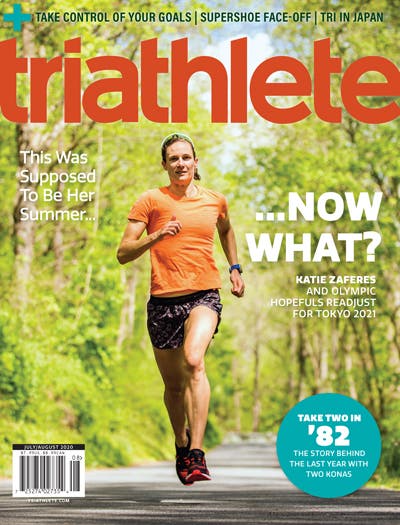Dreams Delayed: How Olympic And Paralympic Hopefuls Are Making The Most Of This Extra Year
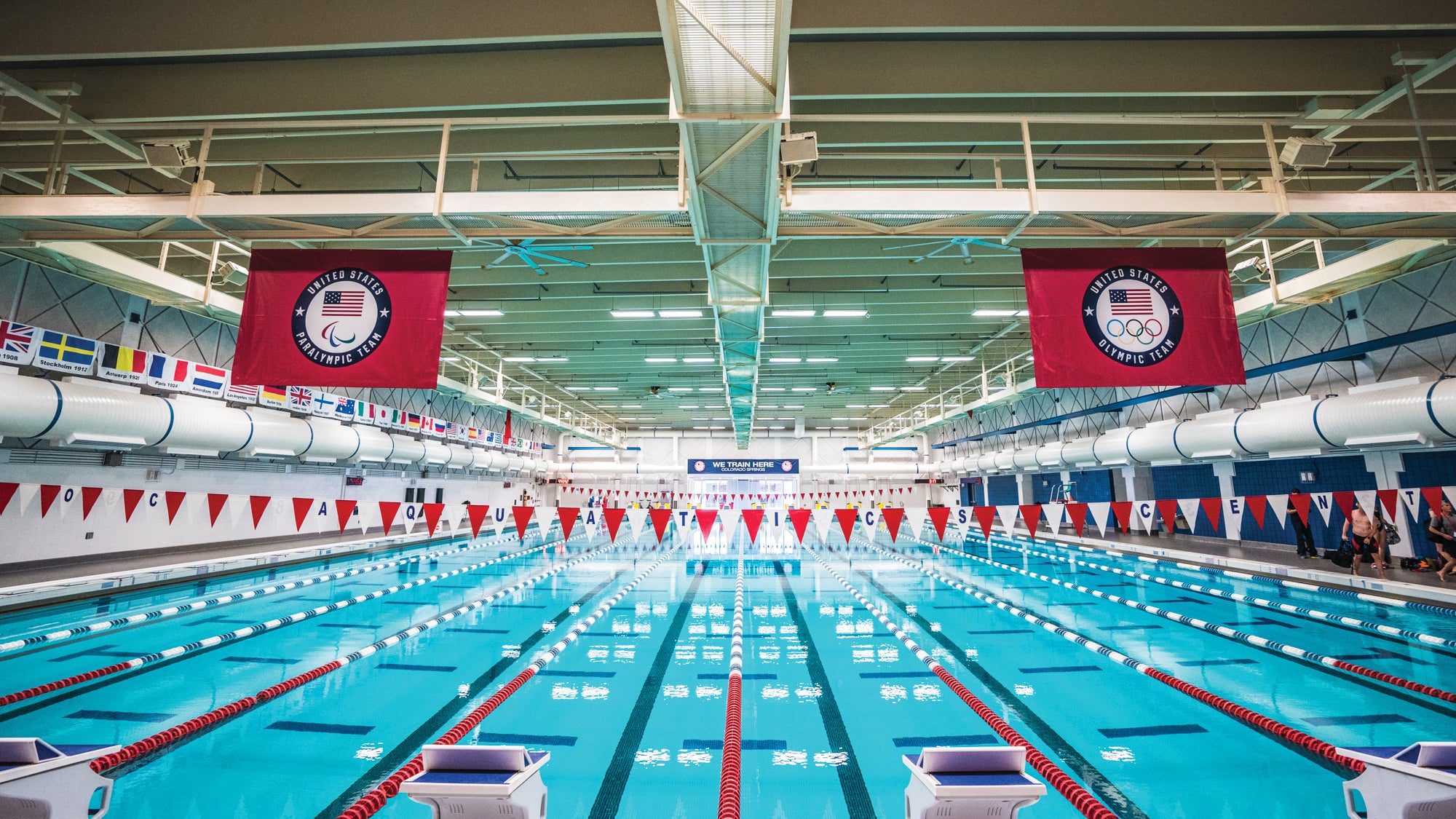
The Olympic Training Center in Colorado Springs closed in March. (Photo: Kenny Withrow)
Olympians, they’re just like us. Just like us, as the COVID-19 pandemic swept the globe, they made do with swim cords in their living rooms and socially distanced rides. They’ve adapted and adjusted; they’ve been flexible and just plain bored.
Summer Rappaport couldn’t swim for two months. Taylor Spivey got so sick of being all by herself she loaded up the car and drove 10 hours to shelter at her boyfriend’s place. Matt McElroy isn’t sure how or if his wedding will happen later this year. Katie Zaferes is doing nightly planks in her pajamas while Facetiming her sister.
And they’re all getting on Zoom calls.
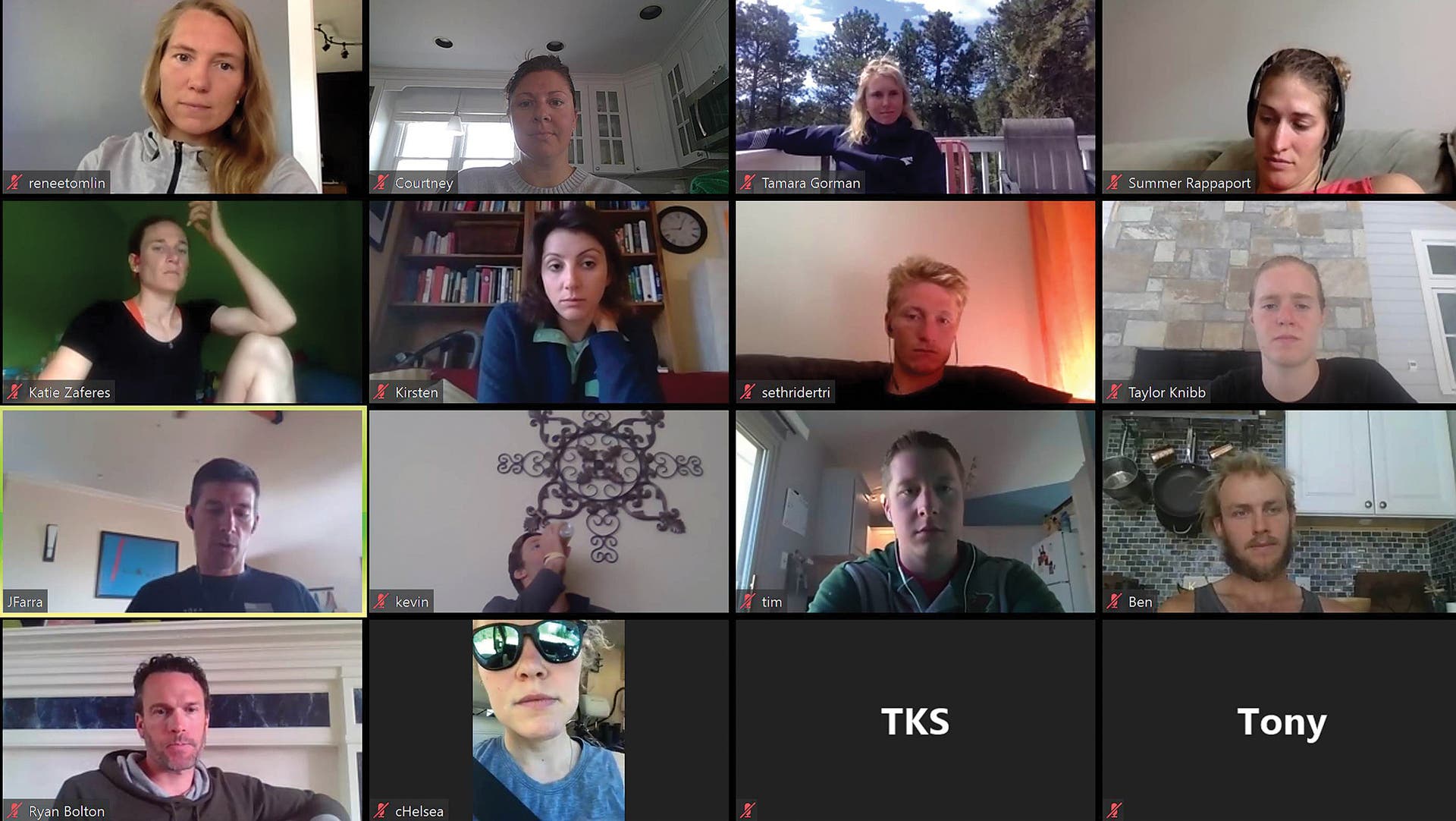
But, Olympians, they’re also not like us: They’re like us, but better.
All of these athletes have been working every day for years towards one goal—and it’s a goal that isn’t really very flexible, that can’t be done “from home.” They’ve been training and sacrificing with their entire lives focused on one big static date circled on the calendar. And then the date moved.
When the IOC announced the Tokyo Games would be moved from July 2020 to the summer of 2021, no one was too surprised. Restrictions and cancellations aimed at preventing the spread of the virus had been growing. A massive international gathering in the summer seemed unlikely and unwise, training had become spotty and uneven from place to place, and the qualification process had come to a screeching halt.
No one was surprised, but that didn’t mean they weren’t disappointed.
“Currently the plan is to continue as planned towards the goals planned until it is no longer the plan,” wrote Katie Zaferes, the defending ITU world champion, in an Instagram post around that time.
Dreams aren’t canceled. They’re just postponed.
The Worst Part Was Not Knowing
At first, it seemed like maybe this was just a temporary setback. Elite athletes are so ingrained to believe the best, most of them thought maybe it was just one race cancellation, one training camp postponed.
“It probably took me two weeks to fully grasp what was going on,” said McElroy, who was with his training squad in South Africa when his coach, Ian O’Brien, sent everyone home.
When the ITU World Triathlon Series race in Abu Dhabi was canceled in mid-March, the various national team members and Olympic hopefuls were scattered all over the world, at their respective team camps with their respective coaches and squads. They were getting ready for a season that was about to start. Zaferes and her husband, Tommy, were on their way to the airport for the start of the race calendar—and then everything changed.
“We were supposed to be on our way to Abu Dhabi,” Zaferes said. Then they started to hear the race might get canceled. The UCI cycling race, the UAE Tour, had been canceled because some of the staff and athletes associated with the race had contracted COVID-19. And the hotel the cyclists were quarantined in was the same hotel the ITU uses—the one that all the triathletes were headed for.
First, Tommy canceled his flight—he was headed out at a different time. They hung out in San Francisco with his parents. Then they told his parents to head home, don’t worry about it, they’d figure out the details, they’d get on some flight at some point.
“We ended up deciding neither of us were getting on our flights. We called his parents and they turned around and drove the 20 minutes back,” she said.
The next question was how bad was this? They were supposed to go from there to Florida to meet her coach and team for training camp. Should they stay in California? Should they go?
“You don’t really know what the right decision is,” she said.
It turned out that yes, they made the right choice in not going to Abu Dhabi. But she kept wondering, at every step, if she was doing the right thing. The two of them stayed in the condo they’d rented in Florida as travel restrictions increased and her training partners slowly trickled back to their homes. At first, it seemed like it made sense to stay put, there were training options available. But then it started to feel all wrong. “It felt like months would pass and instead it was a day,” she said.
Finally, they decided to load up the car and drive 15 hours in one shot to her parents in Maryland, where they could just stay for however long they needed.
For athletes who have spent their whole lives trying to qualify and maybe even win at an event that only comes every four years, the problem—until the Olympic postponement was official—was that they didn’t know if they still needed to be fit and ready. They weren’t going to let their one shot at the Games pass them by.
That uncertainty, at first, caused a lot of anxiety, said John Farra, the high performance general manager for USA Triathlon. Athletes were concerned about the constantly changing ITU schedule and criteria at a time when understanding criteria and ITU points were effectively the rules for their lives. What was the U.S.’s adjusted Olympic qualification process going to be? When would they know for sure? Did they need to be ready to go at any moment?
USAT decided it needed to increase communication during this time, tell everyone clearly that they didn’t need to worry, that there wouldn’t be a restarting to the qualification process until there was consistent training access for everyone for at least 90 days, and that athlete support payments would continue—even as USAT froze all other discretionary spending.
“We got on a Zoom call with the whole national team,” Farra said. First they dealt with business, and then they each showed off their pets—because Olympians, their Zoom calls are just like ours.
Accept, Adapt, Adjust
When the official news came that Tokyo would be postponed a year, Melissa Stockwell had a moment of doubt. “A fleeting moment of ‘Do I want to keep going?’” she said. “A year to some people is nothing, to others it feels like an eternity.”
Stockwell is a former Army officer and two-time Paralympian—first in swimming and then as a bronze medalist in the inaugural Paralympic triathlon event in 2016. She’s 40 years old and has two kids; she and her husband just launched their own business too. Her plan had been to retire after the 2020 Games.
“Now I’ll be 41 when we go to Tokyo,” she said.
But the doubt was momentary. Then she decided this was a whole extra year her kids could see her chasing a big goal, and she realized how valuable that was. The hardest part for her is wondering if each workout really matters right now, with no races on the horizon, but she keeps doing each and every workout—because eventually those little things add up to big things.
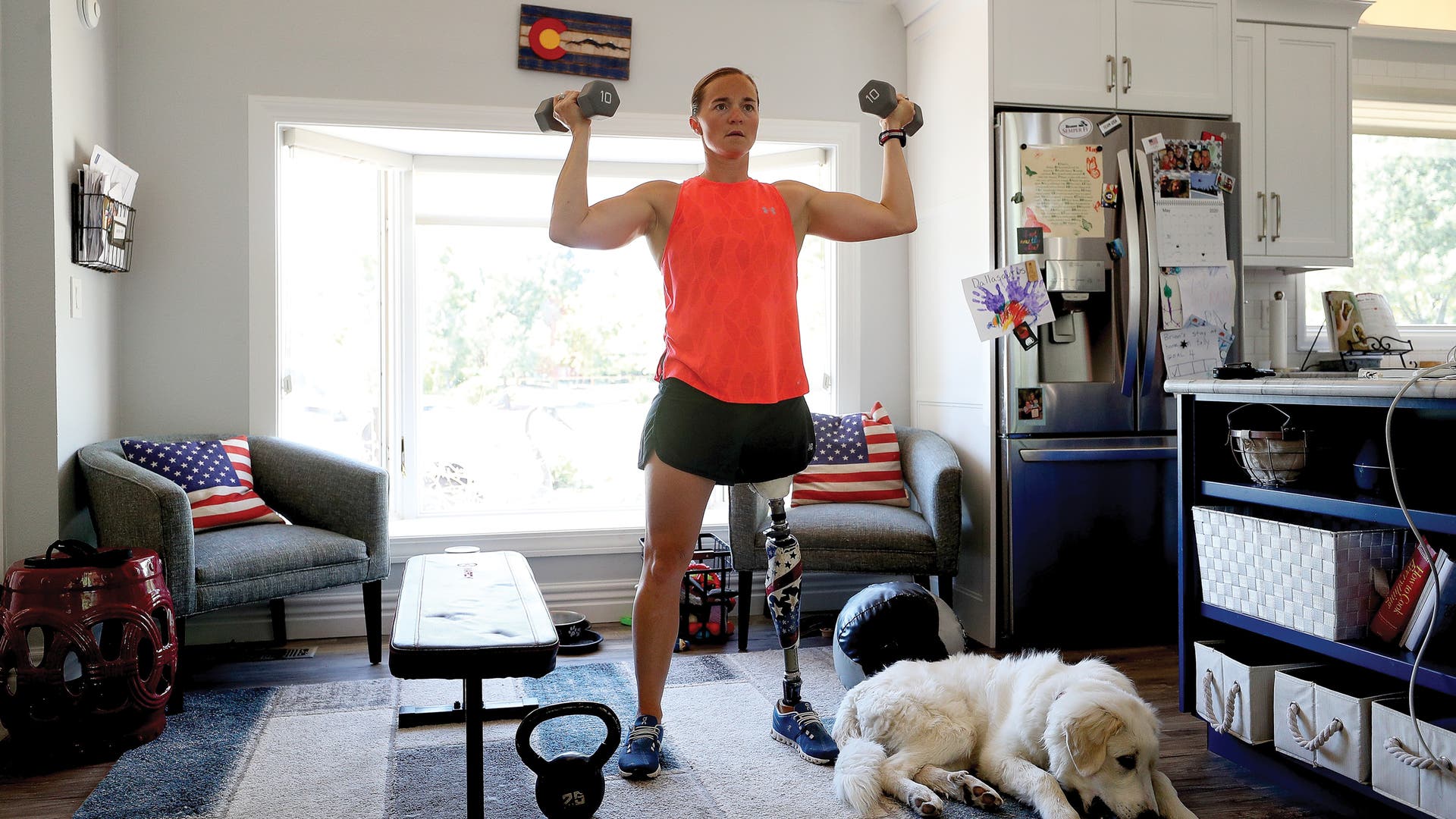
In a way, Paralympians are well-positioned to deal with anything life throws them. Those are skills they’ve learned over years and that they can tap into now. “They’ve all overcome something in their lives that’s really so much more monumental than anything sport can throw at you,” said Derick Williamson, head coach of the U.S. paratriathlon team. “Their resiliency and coping skills and pure grit, that’s just what they do.”
The Paralympic national team is largely a resident team, meaning most of the athletes on the national squad live and train at the Olympic Training Center in Colorado Springs, which closed down in March. Stockwell is a non-resident athlete and lives nearby with her family, but typically spends most of her days at the training center with her teammates. They train together, eat together, hang out together. “We are together all the time,” she said.
All of a sudden, that changed completely. Now they were relying on bi-weekly Zoom calls, chats with their coach, and text messages. Here and there they might meet up for a socially distanced ride, but some of the challenges the para-athletes found themselves facing during shelter-at-home orders were unique to them.
One of the para-athletes is blind and running or riding outside without a guide is challenging. The USAT staff helped find him a treadmill. The staff also loaned out trainers and other equipment. And Farra checked in regularly with all of the Paralympic and Olympic athletes.
For Summer Rappaport, the only American who has already stamped her ticket for the Tokyo triathlon team, the USAT staff helped her find a pool that might allow a 90-minute swim as pools gradually reopened.
“In a lot of ways, I’ve had it easier than a lot of my training partners or peers,” she said. “I definitely feel fortunate.”
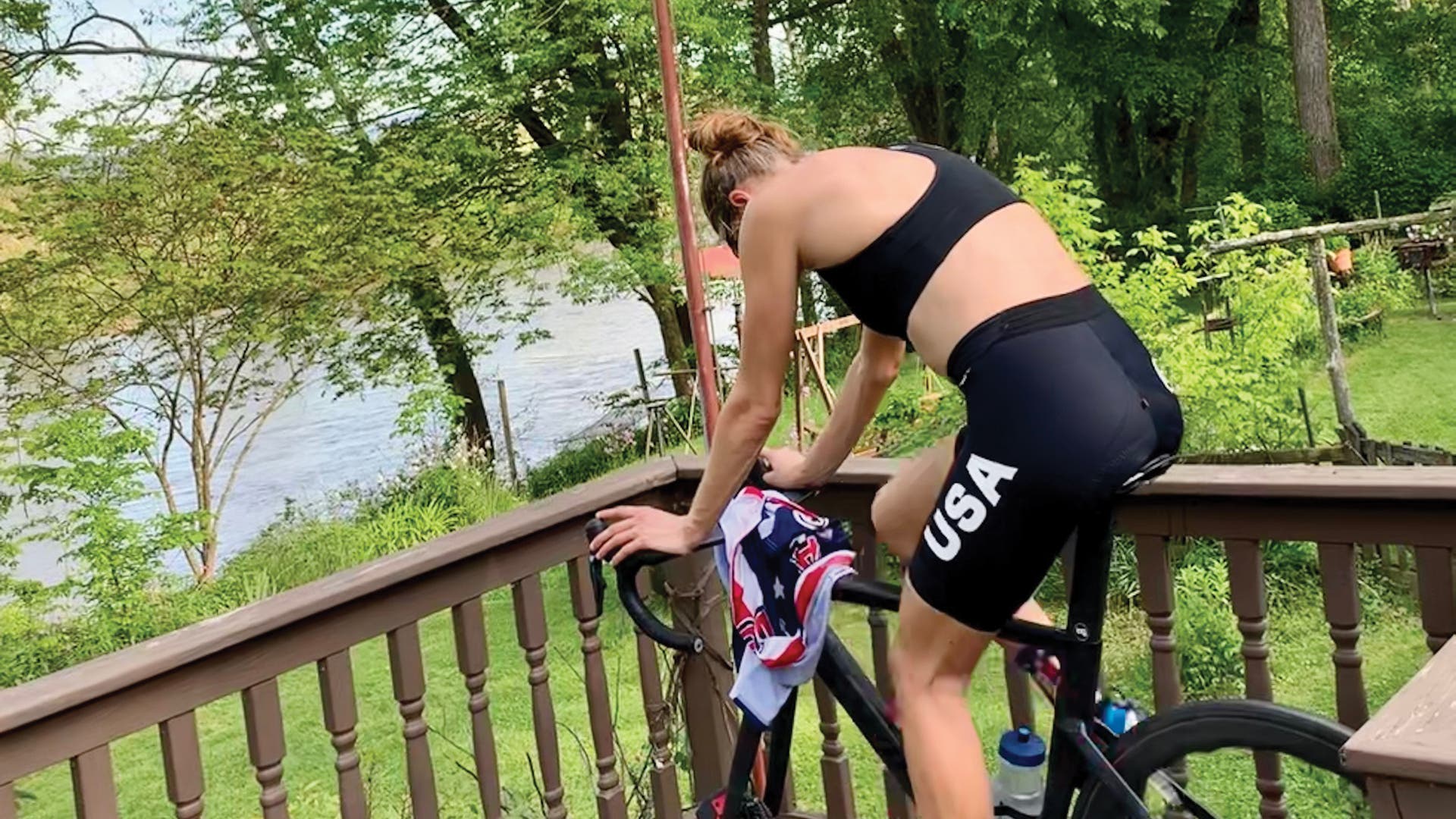
Rappaport and Taylor Spivey, her fellow teammate and contender for the U.S. Olympic squad, have the same coach and were both at a training camp in Portugal when everything started to shut down.
Rappaport headed back to Durham, North Carolina, to be with her husband—except she had actually never lived in Durham before. They had moved there for his job. And usually she’s traveling for races and camps. She had to navigate a new town in the midst of a pandemic.
There’s been an upside, though. It’s been a nice chance to spend more time with her husband, an age-group athlete himself, and get some rides in together. It’s the most time they’ve spent together straight—without her having to fly off—since they first started dating.
“It’s been very odd to be in one place for eight weeks,” she said.
Spivey, instead, stayed in Portugal at first.
She didn’t want to get on a long flight back to the U.S. just as everything was going haywire. And, anyway, she doesn’t even really have a home base in the U.S. She’s used to traveling all the time and living out of suitcases. But then, it just started to get more and more lonely, all by herself.
“It was just mentally hard,” she said.
She decided to load up the car, get some travel advice from friends, and drive the 11 hours straight through to France, where she could stay with her boyfriend, ITU world champion Vincent Luis. She had no idea what would happen at the border or if she’d have to turn around. (She has a French visa; the border guards stamped it and gave her a piece of paper saying she was allowed to travel to where she was going.) But once she got there—even though it was more locked down than where she’d been—it felt so much better.
“It was so nice to share the load with someone and have someone to talk to face-to-face,” she said.
Now, even though she can ride outside, she still gets on Zwift for social rides with her teammates. They WhatsApp and group text.
That’s how all the Olympic hopefuls are getting by, with group texts and Zwift rides, and regular Zoom calls with their friends and family. Katie Zaferes started doing a 10-minute Instagram Live of planks in her PJs every evening at 8 p.m.—her sister Facetimes in, people join on Instagram, even her grandma watches (though she doesn’t participate).
“It’s a very small part of the day, but it connects me,” she said.
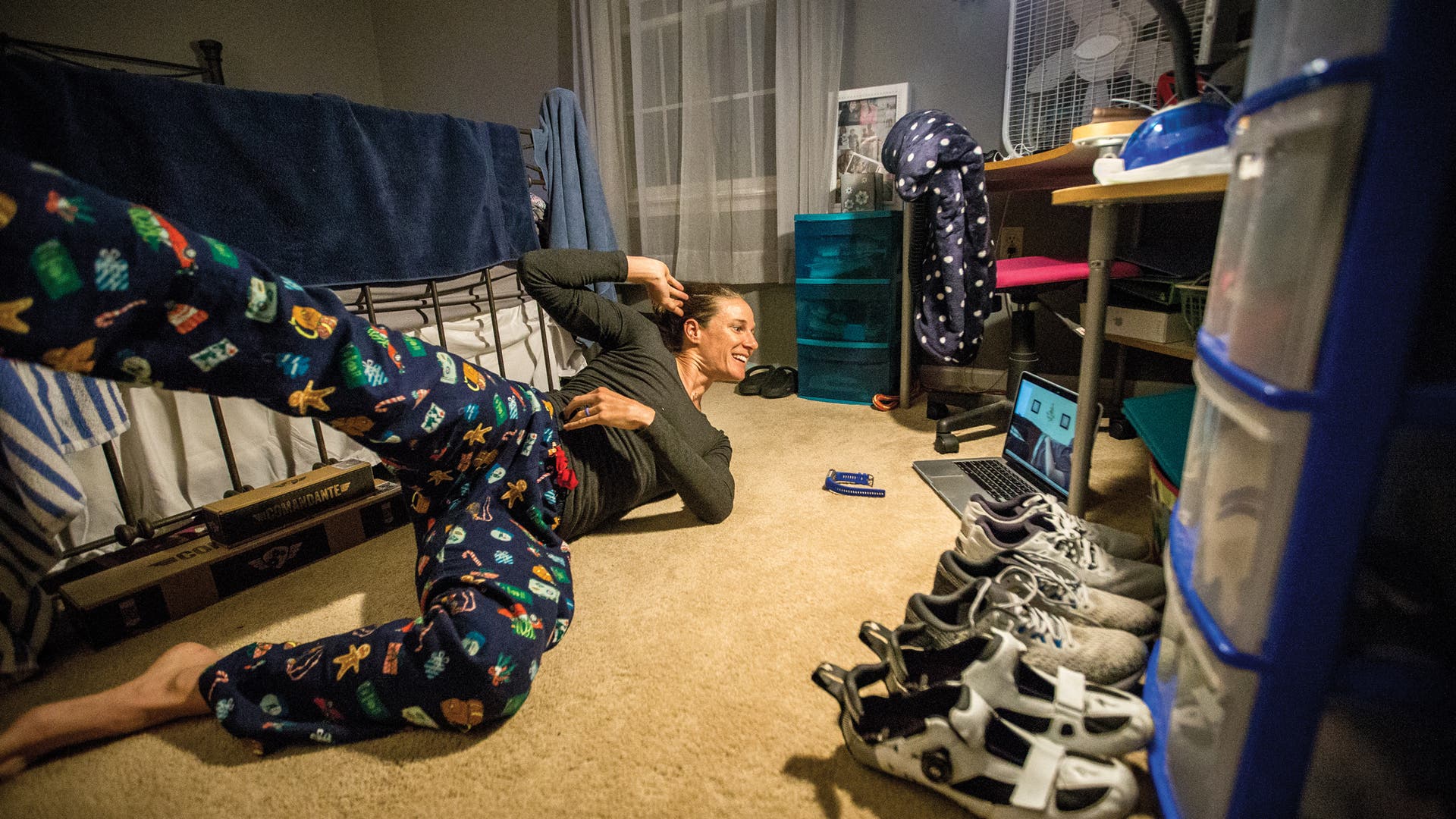
For Some, An Opportunity
Rudy Garcia-Tolson wasn’t planning on trying to make another Paralympic team. He’d been to the Paralympics four times as a swimmer and once as a runner, and made a name for himself as a triathlete—in 2009 becoming the first double above-knee amputee to complete an Ironman. Now he was happily working for the New York Road Runners, putting on youth programs, and coaching some clients.
“I was OK with moving on,” he said.
And then the Tokyo Olympics got postponed a year and he started to have an idea. Maybe that was enough time to get in shape again?
As New York struggled with the peak of the COVID-19 pandemic, he found himself missing his teammates and serious training. He was making do, but he missed having a big goal in his life. This extra year was an opportunity.
So he made a decision. Now, he’s packing up his car and driving to Colorado Springs, hoping to get back in a pool soon and start to get back in shape, so that when the Olympic Training Center reopens, he’s ready. He’s all in to try to make the 2021 Tokyo team for swimming (his classification in paratriathlon wasn’t selected as one of the ones that will be contested in the Games).
“If it’s not going to get back to normal, create a new normal for yourself,” he said. “Figure out what motivates you and gets you going, and go after it.”
Some athletes will be worse off after a year delay, but some will benefit.
McElroy started racing triathlon at 23. Now, he’s 28, the top-ranked American male, the first American man to stand on an ITU WTS podium since 2009, and hoping to make his first Olympics. On the one hand, the extra year is a whole extra year he has to wait. On the other hand, it’s a whole extra year to get faster.
“I’m going to take advantage of a training year,” said McElroy, who’s been in Boulder, Colorado, since everything canceled, putting in the biking and running, working on weaknesses, and talking daily to his coach, Ian O’Brien. “I’m just trying to get better everyday and that’s what I can control.”
For a lot of the athletes, this is their attitude. The race delay is a chance to pull back on training—limit the intensity, go back to base miles—and focus on weaknesses and smaller mini-goals—hitting certain 5K times or nailing strength work—that they might not be able to do the rest of the year. And to have a little fun, throw in some “choice” workouts.
“It’s actually given us more time to develop,” O’Brien said—even if it’s a lot more work to have individual calls with every one of his 14 athletes than to talk to them all in a group squad setting. It’ll be worth it when the Olympics finally come.
“It’s going to be even more a celebration of sport and well worth the wait,” Stockwell said. She’ll be ready. They’ll all be ready. And so will we.
Read this story and others in our current July/August magazine issue, on newstands now. Or become an Active Pass member to get a magazine subscription, exclusive content, partner discounts, and more.
